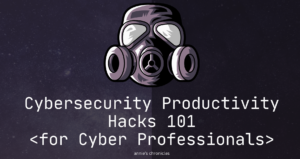Cybersecurity Productivity Hacks 101 for Cyber professionals
If you’re just starting your journey as a cybersecurity professional, welcome to a world that’s as dynamic as it is demanding. Balancing the need to stay ahead of relentless cyber threats while managing your daily workload can feel overwhelming at first. Fear not! This guide is here to help. Whether you’re new to the field or looking to refine your routine, these actionable tips will keep you productive and secure as you navigate the ever-changing digital world.
1. Automate the Mundane
Repetitive tasks can drain your focus and time. Leverage tools like automated scripts for log analysis, alert filtering, or regular system updates. Not only does this free up your bandwidth for high-priority work, but it also reduces the risk of human error which is a common gateway for cyber incidents.
Pro Tip: Use task schedulers to automate routine security checks like patch updates or backup verification. Tools like PowerShell scripts or cron jobs can be lifesavers.
2. Tame the Notifications
In cybersecurity, alerts are non-negotiable, but they can also be overwhelming. Set rules to categorise notifications by urgency and importance. Use dashboards that consolidate alerts from multiple systems to avoid alert fatigue and ensure you’re only reacting to what truly matters.
Never have that moment where you miss a critical alert because your inbox was flooded with low-priority pings!
3. Stay Updated, But Don’t Get Overwhelmed
Staying informed is part of the job, but constantly monitoring news feeds can eat into your productivity. Use RSS feeds or curated newsletters to stay updated on emerging threats without getting lost in the information flood.
Pro Tip: Dedicate a fixed time daily—say 15 minutes in the morning to review the latest security trends and advisories.
4. Segment Your Workspace
As someone in cybersecurity, your workstation is sacred ground. Maintain separate accounts or virtual machines for testing suspicious files or links, isolating them from your main environment.
Why It Matters: One careless click could compromise your system. Isolation reduces that risk while maintaining your operational efficiency.
5. Use Secure Password Managers
Yes, even experts benefit from password managers. They not only store your credentials securely but also generate strong passwords, saving you from the cognitive load of coming up with and remembering dozens of complex strings.
Pro Tip: Look for managers with advanced encryption and multi-factor authentication (MFA).
6. Practice Inbox Discipline
Phishing emails don’t care that you’re a cybersecurity professional—they’re coming for you too. Develop a habit of scrutinising every unexpected email, attachment, or link.
Hack It: Use email clients that highlight potential phishing attempts or integrate anti-phishing plugins to catch anything you might overlook.
7. Master the Art of Focus
The constant influx of alerts, emails, and messages can scatter your attention. Adopt techniques like the Pomodoro method to work in focused bursts, tackling your most critical tasks while still staying responsive to alerts.
Hack: It Block specific hours for deep work—when you deal with complex analysis or incident response and silence non-critical notifications during this time.
8. Document Your Processes
Clear documentation isn’t just for others; it’s for you too. Whether it’s creating a checklist for incident response or maintaining a log of threat-hunting tactics, good documentation saves time and ensures consistency.
Pro Tip: Keep a digital notebook or use tools like Notion or OneNote for easy access to your documented workflows.
9. Leverage AI Without Compromising Security
AI tools can enhance your productivity, but they can also pose security risks. Use trusted, enterprise-grade AI tools to assist with threat analysis, reporting, or even day-to-day productivity tasks like summarising reports.
Reminder: Never input sensitive or proprietary information into external AI tools without verifying their security standards.
10. Prioritise Self-Care
Burnout is real, and it can affect your judgment and productivity. Take regular breaks, maintain a healthy work-life balance, and engage in activities that recharge you—whether it’s hitting the gym or unwinding with a good book.
How many times have you worked late into the night only to realise your brain was fried? A rested mind is a sharper mind.
Being productive as a cybersecurity professional isn’t just about working harder—it’s about working smarter and staying secure while doing so. By automating where possible, organising effectively, and staying focused, you can keep up with the demands of your role while still staying one step ahead of cyber threats.
Which of these hacks resonated with you the most? Or do you have a go-to productivity tip that helps you thrive in your role? Let’s share insights and make cybersecurity a bit more manageable—for all of us.

